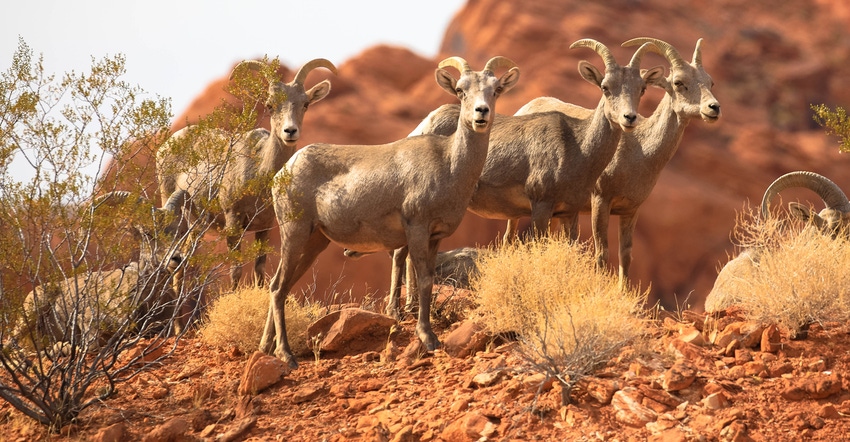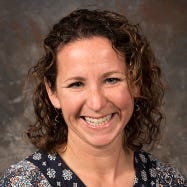
The Riverbend endowed professor of wildlife-livestock health position at the University of Wyoming has the potential to have an immense benefit on the state’s livestock and wildlife, says the faculty member appointed to the position.

NEW IN THE CHAIR: Kerry Sondgeroth takes on a new position at the University of Wyoming. She is a UW associate professor and veterinary biologist, and she will now hold the Riverbend endowed professor of wildlife-livestock health chair at the university.

Kerry Sondgeroth, an associate professor and a veterinary bacteriologist in the Wyoming State Veterinary Laboratory (WSVL), accepted the position in September. She says she hopes the position will build a solid reputation at UW for wildlife-livestock health and bring awareness to the diseases being studied. The position is a five-year appointment.
“I hope this is the beginning of great things to come, with benefits to other researchers, students —and, of course, our livestock and wildlife health in the state of Wyoming,” says Sondgeroth, who joined the Department of Veterinary Sciences in 2014.
Tim Mellon donated the Riverbend Ranch west of Laramie to the UW Foundation in 2011, with proceeds of its eventual sale earmarked to establish the position in the College of Agriculture and Natural Resources.
Sondgeroth says the position can be a middle ground to gain understanding of certain diseases in order to protect the health of wildlife, livestock and humans.
There is strength in a team approach, and understanding that all voices matter, she says.
“Change is always difficult, but in working together, I think we can establish better relationships between researchers and stakeholders,” Sondgeroth says. “My hope is that this position becomes one that is respected by both livestock and wildlife interest groups as an expert in disease, not favoring one stakeholder group over another.”
Sondgeroth received her doctor of veterinary medicine degree from Colorado State University in 2006 and was a post-DVM graduate student from 2006-13 at Washington State University in Pullman, where she received her doctorate in veterinary science in 2013. She grew up in Wyoming and is an alumna of Jackson Hole High School.
Deep bacterial disease knowledge
Sondgeroth says her training and position as the only veterinary bacteriologist in Wyoming provides exposure to many bacterial diseases across the state of interest to livestock producers and wildlife interest groups.
“It has given me the opportunity to collaborate with the Wyoming Game and Fish Department as well as cattle and sheep producers across the state,” she explains. “I have learned what diseases are important to the state and have worked hard to improve the diagnostic testing for bacteria at the WSVL.”
She says the position will:
• help provide hands-on research opportunities for graduate and undergraduate students
• train graduate students on diseases that affect both livestock and wildlife using new technology to answer novel research questions
• connect and build collaborations with other researchers at UW, across the country and internationally who are interested in wildlife and livestock health
Graduate and undergraduate research student support is of particular interest to Sondgeroth.
“This is really important to me, as funding in wildlife-livestock research is difficult to find, but the questions we are trying to answer are really important,” she says.
The Riverbend endowment is funding four pilot projects, says Jonathan Fox, head of the Department of Veterinary Sciences.
“The total funded amount from the Riverbend fund equates to about $190,000 per year for the first two years,” he says. “After that, we should have funds for another request for proposals.”
Research in action
The researchers (all in the Department of Veterinary Sciences) and their projects include:
• Assistant professor Berit Bangoura, “Parasitic nematode prevalence and transmission dynamics at the Wyoming wildlife-livestock interface, with special respect to anthelmintic drug resistance distribution in ruminants”
• Assistant professor Jennifer Malmberg, “Whole genome characterization of Mycoplasma bovis in wildlife and livestock”
• Associate professor Brant Schumaker, “Bioeconomic analysis of management options for chronic wasting disease and brucellosis in the greater Yellowstone area.”
• Sondgeroth, “Characterization of bacteria that cause disease in livestock and bighorn sheep.”
Miller writes for the University of Wyoming Extension.
Source: University of Wyoming, which is solely responsible for the information provided and is wholly owned by the source. Informa Business Media and all its subsidiaries are not responsible for any of the content contained in this information asset.
About the Author(s)
You May Also Like




